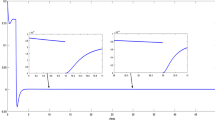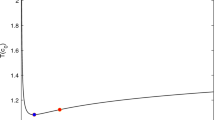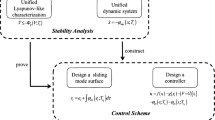Abstract
The stability analysis issue of switched positive systems (SPSs) with an impulse interval is discussed in this paper for the first time. All subsystems are allowed to be unstable. Unlike previous studies, the impulse is restricted to an interval, that is, the impulse interval. By dividing the state space on the nonnegative orthant and establishing multiple linear copositive Lyapunov functions, sufficient linear programming conditions are obtained to ensure that SPSs with an impulse interval are asymptotically stable. A hysteresis state-dependent switching law is designed to prevent the chattering behavior caused by frequent switching. Finally, two numerical examples are given to validate the theoretical findings.







Similar content being viewed by others
References
A. Arbi, C. Aouiti, F. Cherif et al., Stability analysis for delayed high-order type of Hopfield neural networks with impulses. Neurocomputing 165, 312–329 (2015)
A. Arbi, C. Aouiti, F. Cherif et al., Stability analysis of delayed Hopfield neural networks with impulses via inequality techniques. Neurocomputing 158, 281–294 (2015)
A. Arbi, J. Cao, A. Alsaedi, Improved synchronization analysis of competitive neural networks with time-varying delays. Nonlinear Anal. Model. Control 23(1), 82–102 (2018)
A. Arbi, Dynamics of BAM neural networks with mixed delays and leakage time-varying delays in the weighted pseudo-almost periodic on time-space scales. Math. Methods Appl. Sci. 41(3), 1230–1255 (2018)
A. Arbi, J. Cao, Pseudo-almost periodic solution on time-space scales for a novel class of competitive neutral-type neural networks with mixed time-varying delays and leakage delays. Neural Process. Lett. 46(2), 719–746 (2017)
A. Arbi, A. Alsaedi, J. Cao, Delta-differentiable weighted pseudo-almost automorphicity on time-space scales for a novel class of high-order competitive neural networks with WPAA coefficients and mixed delays. Neural Process. Lett. 47(1), 203–232 (2018)
C. Briat, Dwell-time stability and stabilization conditions for linear positive impulsive and switched systems. Nonlinear Anal.: Hybrid Syst. 24, 198–226 (2017)
G. Chen, Y. Yang, J. Li, On input-to-state stability of discrete-time switched nonlinear time-varying systems. IEEE Trans. Autom. Control 64(12), 5214–5221 (2019)
G. Cheng, Y. Yang, New necessary and sufficient conditions for finite-time stability of impulsive switched linear time-varying systems. IET Control Theory Appl. 12(1), 140–148 (2018)
I. Dassios, Stability and robustness of singular systems of fractional nabla difference equations. Circuits Syst. Sig. Proc. 36(1), 49–64 (2017)
I. Dassios, G. Tzounas, F. Milano, Participation factors for singular systems of differential equations. Circuits Syst. Sig. Proc. 39(1), 83–110 (2020)
M. Darouach, M. Chadli, Admissibility and control of switched discrete-time singular systems. Syst. Sci. Control Eng. 1(1), 43–51 (2013)
L. Farina, S. Rinaldi, Positive linear systems: theory and applications (Wiley, Amsterdam, 2000)
L. Gao, Y. Cai, Finite-time stability of time-delay switched systems with delayed impulse effects. Circuits Syst. Sig. Proc. 35(9), 3135–3151 (2016)
A. Jadbabaie, J. Lin, A.S. Morse, Coordination of groups of mobile autonomous agents using nearest neighbor. IEEE Trans. Autom. Control 48(6), 988–1001 (2003)
D. Leith, P. Clifford, Convergence of distributed learning algorithms for optimal wireless channel allocation. in Proceedings of IEEE Conference on Decision and Control, pp. 2980-2985 (2006)
J. Liu, J. Lian, Y. Zhuang, Output feedback \(L_1\) finite-time control of switched positive delayed systems with MDADT. Nonlinear Anal.: Hybrid Syst. 15, 11–22 (2015)
J. Liu, J. Lian, Y. Zhuang, Robust stability for switched positive systems with D-perturbation and time-varying delay. Inf. Sci. 369, 522–531 (2016)
L. Liu, X. Gao, B. Fan, Z. Fu, \(L1\) Input-output finite-time control of positive switched nonlinear systems. Math Probl Eng 2019, 9132906 (2019)
L. Liu, X. Cao, Z. Fu et al., Input-output finite-time control of uncertain positive impulsive switched systems with time-varying and distributed delays. Int. J. Control Autom. Syst. 16(2), 670–681 (2018)
L. Liu, X. Cao, Fu Z et al., Finite-time control of uncertain fractional-order positive impulsive switched systems with mode-dependent average dwell time. Circuits Syst., Sig. Proc. 37(9), 3739–3755 (2018)
L. Liu, H. Xing, X. Cao, Guaranteed cost finite-time control of discrete-time positive impulsive switched systems. Complexity 2018, 5790681 (2018)
L. Liu, H. Xing, X. Cao, Asynchronously input-output finite-time control of discrete-time nonlinear impulsive positive switched systems. Trans. Inst. Meas. Control 41(14), 4157–4166 (2019)
M. Liu, I. Dassios, F. Milano, On the stability analysis of systems of neutral delay differential equations. Circuits Syst. Sig. Proc. 38(4), 1639–1653 (2019)
T. Liu, B. Wu, L. Liu, Y. Wang, Asynchronously finite-time control of discrete impulsive switched positive time-delay systems. J. Frankl. Inst. 352(10), 4503–4514 (2015)
Y. Liu, H. Zhi, J. Wei, Event-triggered control for linear continuous switched singular systems. Appl. Math. Comput. 374, 125038 (2020)
Z. Liu, X. Zhang, X. Lu, T. Hou, Exponential stability of impulsive positive switched systems with discrete and distributed time-varying delays. Int. J. Robust Nonlinear 29(10), 3125–3138 (2019)
S. Li, Z. Xiang, Stability and \(L_1\)-gain control for positive impulsive switched systems with mixed time-varying delays. IMA J. Math. Control Inf. 34(4), 1339–1358 (2017)
Y. Li, H. Zhang, Dwell time stability and stabilization of interval discrete-time switched positive linear systems. Nonlinear Anal.: Hybrid Syst. 33, 116–129 (2019)
D. Wang, G. Li, W. Wang, X. Guo, A new model for a traffic flow based on multi-agent and positive switched systems. in 6th International Conference on Information Science and Technology(SICIST), pp. 306–310 (2016)
J. Wang, J. Liang, A.M. Dobaie, Stability analysis and synthesis for switched Takagi-Sugeno fuzzy positive systems described by the Roesser model. Fuzzy Sets Syst. 371, 25–39 (2019)
H. Xing, L. Liu, X. Cao, Guaranteed cost finite-time control of positive switched nonlinear systems with D-perturbation. Open Math. 15, 1635–1648 (2017)
M. Xiang, Z. Xiang, Stability analysis, \(l_1\)-gain and control synthesis for positive switched systems with time-varying delay. Nonlinear Anal.: Hybrid Syst. 9, 9–17 (2013)
L. Zhu, J. Qiu, M. Chadli, Modelling and stability analysis of switching impulsive power systems with multiple equilibria. Int. J. Syst. Sci. 48(16), 3470–3490 (2017)
S. Zhu, Q. Han, C. Zhang, \(L_1\)-gain performance analysis and positive filter design for positive discrete-time Markov jump linear systems: a linear programming approach. Automatica 50(8), 2098–2107 (2014)
Acknowledgements
The work was supported by the Natural Science Foundation of Hebei Province, F2017202009 and Innovative Capability Improvement Program of Hebei Province, 18961604H.
Author information
Authors and Affiliations
Corresponding author
Additional information
Publisher's Note
Springer Nature remains neutral with regard to jurisdictional claims in published maps and institutional affiliations.
Rights and permissions
About this article
Cite this article
Liu, J., Yin, K., Yang, D. et al. Stability Analysis of Switched Positive Systems with an Impulse Interval. Circuits Syst Signal Process 40, 1005–1020 (2021). https://doi.org/10.1007/s00034-020-01495-7
Received:
Revised:
Accepted:
Published:
Issue Date:
DOI: https://doi.org/10.1007/s00034-020-01495-7




